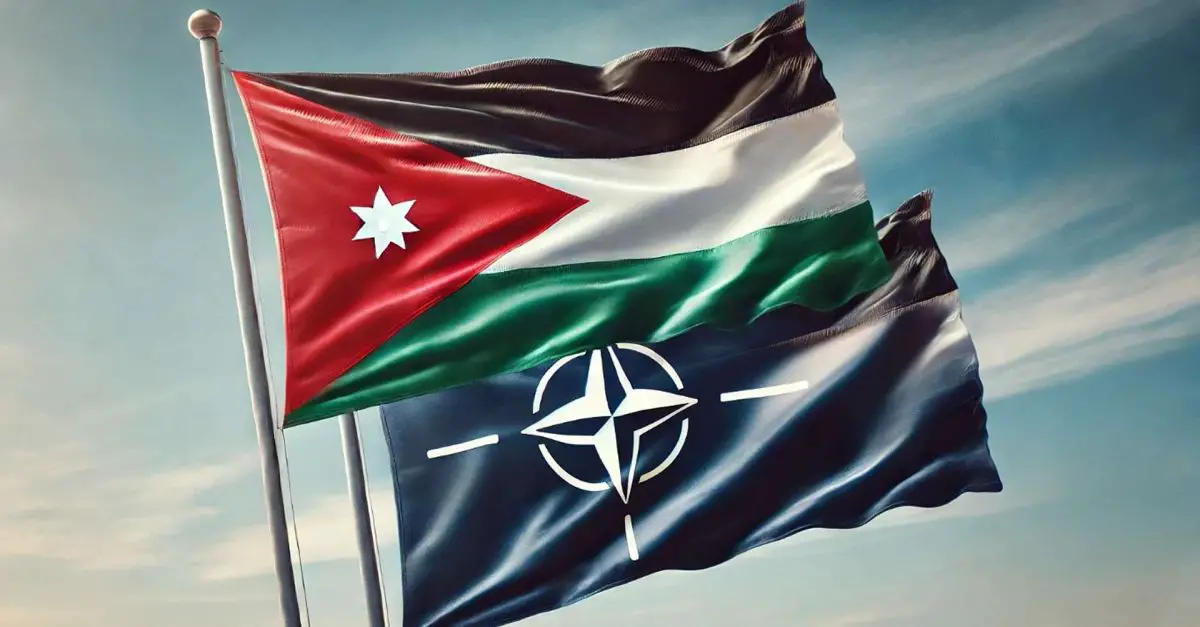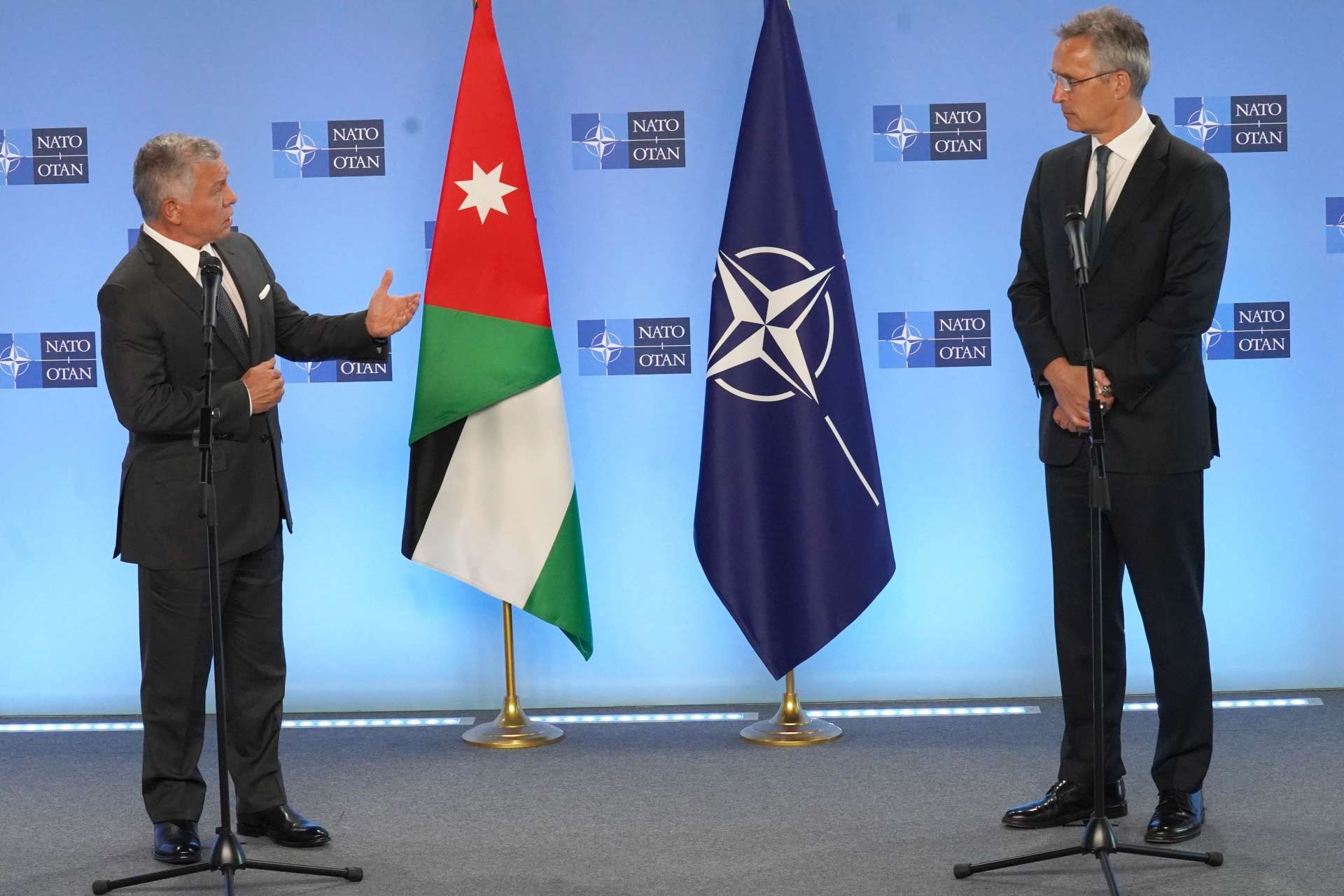Breaking News
Jordan opens the first NATO liaison office in the Middle East.
On July 10, 2024, NATO and Jordan announced the establishment of a liaison office in Amman, the first NATO liaison office in the Middle East and North Africa region. This decision was made during a NATO summit in Washington, reflecting an action plan to implement a more strategic and results-oriented approach towards NATO's southern neighborhood.
Follow Army Recognition on Google News at this link

NATO and Jordan have maintained strong bilateral relations for nearly three decades, particularly through the Mediterranean Dialogue (MD), a NATO initiative established in 1994 to promote security and stability in the Mediterranean region. (Picture source: Army Recognition/AI-generated picture)
This initiative follows the intent expressed in the Vilnius summit communiqué of July 2023, marking a significant step in the partnership between Jordan and NATO. It emphasizes Jordan's role in addressing transnational threats such as terrorism and violent extremism. The liaison office will function as a representative office, facilitating regular interactions between NATO and Jordanian authorities. This arrangement aims to enhance political dialogue and practical cooperation on mutual interests, including strategic analysis, civil emergency planning, crisis management, public diplomacy, cybersecurity, and climate change.
NATO and Jordan have maintained strong bilateral relations for nearly three decades, particularly through the Mediterranean Dialogue (MD), a NATO initiative established in 1994 to promote security and stability in the Mediterranean region. The MD, which operates on two main pillars (political dialogue and practical cooperation), involves seven non-NATO countries: Algeria, Egypt, Israel, Jordan, Mauritania, Morocco, and Tunisia.
The framework of the Mediterranean Dialogue is based on six key principles to ensure that the specific needs and contexts of each partner country are taken into account: non-discrimination, self-differentiation, two-way engagement, non-imposition, diversity, and complementarity with other international initiatives.
Since its inception, the MD has evolved, expanding its scope and deepening cooperation. Individual Partnership Cooperation Programmes (IPCPs) are negotiated every two years with each partner country, providing a structured framework for collaboration. Therefore, the establishment of a NATO liaison office in Amman is a continuation of this partnership, likely to strengthen it further, as MD partners participate in NATO operations, military exercises, and various cooperative initiatives.

Since joining the Mediterranean Dialogue in 1995, Jordan has been a close NATO ally. For instance, discussions in Brussels in 2021 focused on the partnership between Jordan and NATO, as well as cooperation in military training, security, and counterterrorism. (Picture source: Jordan News Agency)
The opening of this office, the first NATO liaison office in the Middle East and North Africa region, deepens the strategic partnership between NATO and Jordan, focusing on enhancing regional security and addressing common threats such as terrorism, cybersecurity, and regional instability. Jordan’s role as a security partner for NATO is emphasized by this initiative. Since joining the Mediterranean Dialogue in 1995, Jordan has been a close NATO ally, and the new office will support its status as a key player in regional security. It will serve as an operational hub, enabling coordination and cooperation on various security initiatives, including border security, counter-terrorism, and intelligence sharing.
This move also reflects NATO’s strategic pivot towards more proactive engagement in the Middle East and North Africa. By having a permanent presence in Amman, NATO can address regional challenges and respond swiftly to crises, particularly relevant given the ongoing conflicts in neighboring countries like Syria, Israel, and Iraq. Additionally, the liaison office will enhance Jordan's defense capabilities through increased access to NATO’s training, education, and technological resources, enabling the country to address threats such as drug trafficking, border security issues, and extremist activities.
To date, Jordan faces a range of security threats, including increased drug and weapon smuggling activities across its borders, primarily from Syria. Smugglers are using more advanced arms and drones, posing a significant challenge to national security. The regional instability, particularly the conflict between Israel and Hamas, has heightened domestic tensions, leading to protests and calls for action against Israel within Jordan. Additionally, the activities of pro-Iran militias and the ongoing conflicts in neighboring countries such as Syria and Iraq contribute to the complex security landscape, necessitating ongoing vigilance and cooperation with international allies.
From NATO’s perspective, the liaison office in Amman offers several advantages. It enhances the Alliance's ability to address regional security threats more efficiently by streamlining coordination and response efforts in areas such as counter-terrorism, cybersecurity, and border security. This proximity allows for direct and timely interactions with Jordanian authorities and other regional partners, improving the effectiveness of joint security initiatives. Furthermore, the office facilitates deeper and continuous political dialogue between NATO and Jordan, essential for developing and implementing strategic policies tailored to the unique security landscape of the Middle East and North Africa.


























